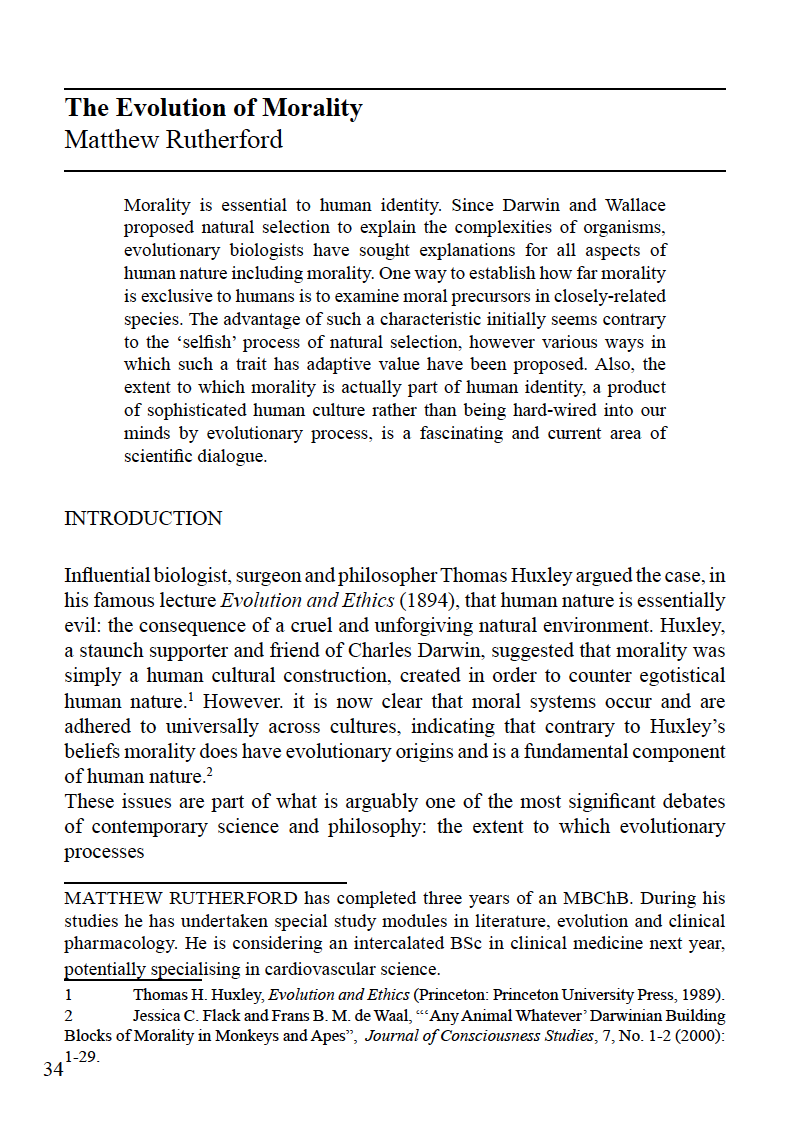The Evolution of Morality
DOI:
https://doi.org/10.36399/GroundingsUG.1.273Keywords:
Morality, Evolution, Human Identity, Natural Selection, Selfish, Culture, DialogueAbstract
Morality is essential to human identity. Since Darwin and Wallace proposed natural selection to explain the complexities of organisms, evolutionary biologists have sought explanations for all aspects of human nature including morality. One way to establish how far morality is exclusive to humans is to examine moral precursors in closely-related species. The advantage of such a characteristic initially seems contrary to the ‘selfish’ process of natural selection, however various ways in which such a trait has adaptive value have been proposed. Also, the extent to which morality is actually part of human identity, a product of sophisticated human culture rather than being hard-wired into our minds by evolutionary process, is a fascinating and current area of scientific dialogue.
References
Alexander, Richard D. The Biology of Moral Systems, Hawthorne, NY: Aldinede Guyter, 1987.
Boehm, Christopher. “Conflict and the Evolution of Social Control.” Journal of Consciousness Studies 7 (Special Issue on Evolutionary Origins of Morality) (2000): 79-183.
Darwin, Charles. The Descent of Man, and Selection in Relation to Sex. Princeton: Princeton University Press, 1982 (1871).
Dawkins, Richard. The Selfish Gene. Oxford: Oxford University Press, 1976.
de Waal, Frans B. M. “Food-sharing and Reciprocal Obligations in Chimpanzees.” Journal of Human Evolution 18 (1989): 433-459.
de Waal, Frans B. M. “The Chimpanzee’s Service Economy: Food for Grooming.” Evolution and Human Behavior, 18 (1997): 1-12.
Flack, Jessica C. and Frans B. M. de Waal. “‘Any Animal Whatever’ Darwinian Building Blocks of Morality in Monkeys and Apes.” Journal of Consciousness Studies, 7, No. 1-2 (2000): 1-29.
Flack, Jessica C. and Frans B. M. de Waal. “Being Nice Is Not a Building Block of Morality Response to Commentary Discussion.” Journal of Consciousness Studies, 7, No.1-2 (2000): 67-77.
Gould, Stephen J. and Elisabeth S. Vrba. “Exaptation; a Missing Term in the Science of Form.” Paleobiology 8,1 (January 1982): 4-15.
Güth, Sandra and Werner Güth. “Morality Based on Cognition in Primates.” Journal of Consciousness Studies, 7, No.1-2 (2000): 43-46.
Huxley, Thomas H. Evolution and Ethics. Princeton: Princeton University Press, 1989.
Kagan, Jerome. “Human Morality is Distinctive.” Journal of Consciousness Studies, 7, No.1-2 (2000): 46-48.
Kropotkin, Petr Alekseevich. Mutual Aid: A Factor of Evolution, rev. ed. London: Heinemann, 1908.
Lieberman, Debra, John Tooby and Lada Cosmides. “Does Morality have a Biological Basis? An Empirical Test of the Factors Governing Moral Sentiments Relating to Incest.” Proceedings of the Royal Society, 270 (2003): 818.
Nesse, Randolph. “How Selfish Genes Shaped Moral Passions.” Journal of Consciousness Studies, 7, No.1-2 (2000): 227-231.
Sober, Elliott and David Sloan Wilson. Unto Others. Cambridge, MA: Harvard University Press, 1998.
Thierry, Bernard. “Building Elements of Morality are not Elements of Morality.” Journal of Consciousness Studies, 7, No.1-2 (2000): 60-62.
Williams, George C. “Reply to comments on ‘Huxley’s Evolution and Ethics in a Sociobiological Perspective.” Zygon, 23 (1998): 383-407.

Downloads
Published
Issue
Section
License
Copyright (c) 2007 Matthew Rutherford

This work is licensed under a Creative Commons Attribution 4.0 International License.
The CC BY 4.0 license is a Creative Commons license. This is a non-copyleft free license that is good for art and entertainment works, and educational works. It is compatible with all versions of the GNU GPL; however, like all CC licenses, it should not be used on software. People are free to: Share — copy and redistribute the material in any medium or format; Adapt — remix, transform, and build upon the material for any purpose, even commercially. The licensor cannot revoke these freedoms as long as you follow the license terms. But they must conform to the following terms: Attribution — You must give appropriate credit, provide a link to the license, and indicate if changes were made. You may do so in any reasonable manner, but not in any way that suggests the licensor endorses you or your use. No additional restrictions — You may not apply legal terms or technological measures that legally restrict others from doing anything the license permits.
Please check individual article PDF copies to see if any additional restrictions apply.







